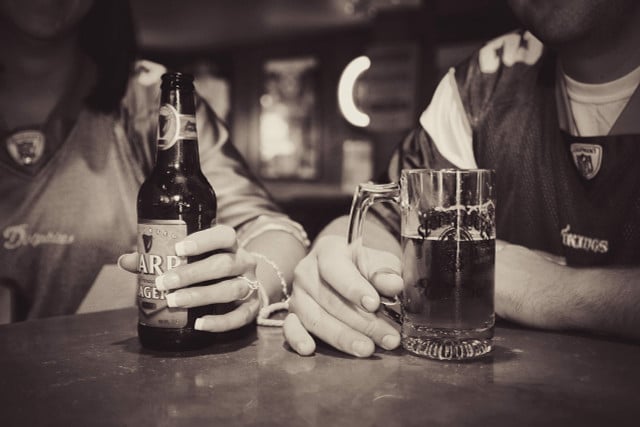
Alcohol poisoning can occur when people consume large amounts of alcohol. The transition from intoxication to intoxication is fluid. Here you can find out what symptoms you need to look out for and how you can help in an emergency.
Alcohol is considered a stimulant, but strictly speaking it is a cytotoxin: it inhibits the transmission of information between nerve cells and thus slows down the ability to perceive and react, among other things. So, technically speaking, even a little buzz after a glass of sparkling wine is very mild alcohol intoxication. However, it usually remains harmless in such small amounts.
It can be dangerous with larger amounts of alcohol, especially if they are consumed over a comparatively short period of time. The alcohol content in the blood can then rise to such an extent that there are stronger signs of intoxication. Sometimes alcohol poisoning can be fatal under these circumstances.
The treacherous thing is that intoxication and intoxication are very close together and the transitions between the two states are often fluid. The amount of alcohol that a person can “tolerate” also varies greatly from person to person and depends, among other things, on physical conditions such as size and weight. But factors such as getting used to it or alcohol tolerance (e.g. due to long-term heavy alcohol consumption) can also play a role.
Alcohol poisoning: These are the symptoms to watch out for

(Photo: CC0 / Pixabay / StockSnap)
Due to these individual differences, the stages of alcohol poisoning are usually not determined by the amount consumed, but by the alcohol level. A per thousand stands for one thousandth, in this case for one milligram of alcohol per gram of blood.
On this basis, physicians distinguish between four stages of alcohol poisoning. Each level is associated with typical symptoms – which alcohol levels it is assigned to can vary slightly from source to source. The medicine portal Netdoktor proposes this classification:
-
Stage 1: Excitation stage (1 to 2 parts per thousand): The first stage stands for light drunkenness. It is characterized by relaxation and disinhibition, increased talkativeness, reduced responsiveness and overconfidence. Physical symptoms such as (slight) balance and gait disorders can also appear.
-
Stage 2: Hypnosis stage (2 to 2.5 per thousand): In the second stage, tiredness often sets in, but those affected can be woken up again when they fall asleep. Their comprehension and thinking skills slow down, they may become upset or aggressive. When walking, severe balance disorders are already evident.
-
Stage 3: Anesthetic stage (2.5 to 4 parts per thousand): In the third stage, the initial tiredness can turn into deep unconsciousness. The muscles relax, the sensitivity to pain decreases, reflexes stop working, and shock from a lack of oxygen supply can occur.
-
Stage 4: Asphyxia stage (more than 4 parts per thousand in the blood): This stage at the latest is life-threatening. Circulatory and respiratory disorders set in or worsen. In addition, heavily intoxicated people cool down quickly when exposed to cold and are at risk of freezing to death.
Attention: At the latest, if someone becomes unconscious under the influence of alcohol, you should call an ambulance, advises the BzGA information portal. However, medical help is not necessarily only important in the third or fourth stage, but can also be needed earlier and with milder symptoms of alcohol poisoning. If in doubt, you should therefore not hesitate to call the emergency number 112.
How to help with alcohol poisoning

(Photo: CC0 / Pixabay / TechLine)
According to the BzGA, if you observe symptoms of alcohol poisoning in someone, you should seek medical help quickly. On the other hand, you should refrain from self-applied “home remedies” – such as shaking an unconscious person or pouring water in their face.
According to Netdoktor, however, you can do the following to assess the situation and provide first aid to the poisoned person:
- First check whether the person is still conscious: Can they speak? Does she respond to touch? Then, make her stop drinking alcohol and give her water to drink instead. Cover her with a blanket to keep her from getting cold.
- If the drunk vomits, give him/her help. Don’t try to force the vomit, however, as this can lead to complications.
- You should put an unconscious drunk in the recovery position and also provide a blanket so that he/she maintains body temperature. Stay close to him or her until medical help arrives, and keep checking to make sure he or she is still breathing. Begin CPR attempts immediately if breathing stops.
It doesn’t matter whether the person in need of help is still conscious or not: under no circumstances leave them alone and keep an eye on them. In this way you also reduce the risk of injury, which is increased by the reduced reaction strength. Also check whether the drunk person has already suffered injuries – especially head wounds – and inform the emergency services if this is the case.
Read more on Techzle.com:
- Film tear: This is how an alcohol-related blackout occurs
- 4 weeks without alcohol: That’s what it does to your body
- Alcohol-free vs. 0.0 beer: That’s the difference